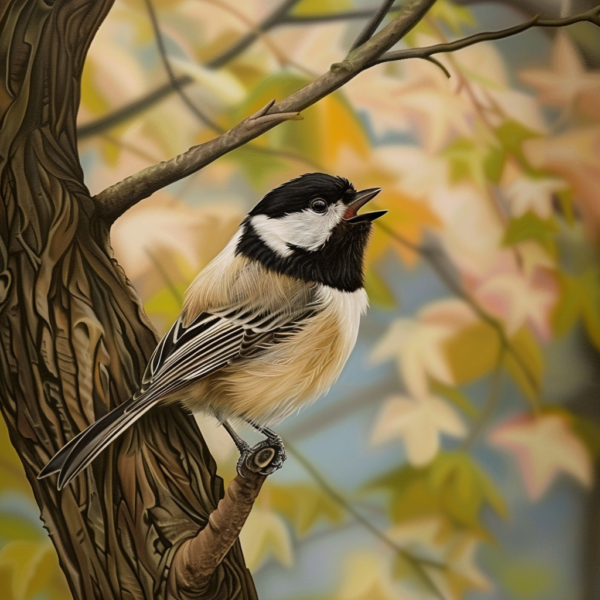
Exploring the Science Behind Nature’s Mood Booster
Why does birdsong make us feel better? In the early morning I often go out onto our deck to relax and listen to the birdsong. Over time, I have learned to recognize the birds singing this beautiful chorus. The Cornell Merlin bird app helps me identify the birds singing. I always hear Blue Jays, Cardinals, and Crows. This is a great way to start the day because it makes me feel calm, happy and renewed. Have you wondered why birdsong makes us feel better?
Whether heard at sunrise in the countryside or from an open window in the city, birdsong is a sound often linked with feelings of calm and contentment. Research shows that listening to birdsong can noticeably improve mood and reduce stress, offering a natural boost to well-being. The unique harmonies and patterns in bird songs are more than pleasant sounds—they can help people feel more connected to nature and present in the moment.
In an age where daily life is filled with noise and digital distractions, the simple act of listening to birds can offer a refreshing mental break. Birdsong has even inspired musical compositions and poetry, highlighting its cross-cultural appeal and impact on creativity.
Key Takeaways
- Birdsong supports mental well-being and stress relief.
- Exposure to natural sounds can enhance daily life, especially in urban environments.
- Simple ways to enjoy birdsong can benefit anyone, anywhere.
The Science Behind Why Birdsong MAKES US FEEL BETTER
Birdsong has measurable effects on the human brain and is linked to notable improvements in mental health. Research highlights that listening to natural sounds like birdsong can create a sense of happiness and support overall well-being.
How Birdsong Affects the Brain
Scientists have found that birdsong stimulates regions of the brain related to relaxation and positive emotions. EEG and MRI studies indicate increased activity in the prefrontal cortex when people are exposed to birdsong, a region associated with emotional regulation and stress reduction.
Natural sounds, including birdsong, have been shown to lower levels of cortisol, the body’s primary stress hormone. When subjects listen to birdsong, they often experience slower heart rates and decreased anxiety. This reaction is especially notable in urban residents, who generally report enhanced well-being after exposure to bird sounds compared to artificial city noises.
California Polytechnic State University researchers observed that students exposed to birdsong for a short period reported better mood and focus. These studies suggest that the brain’s response to birdsong is both immediate and significant, contributing to relaxation and improved cognitive function.
Connection Between Birdsong and Well-being
Numerous studies, including those reported in Proceedings of the Royal Society B, have demonstrated an association between exposure to birdsong and improved mental health outcomes. Individuals exposed to varied bird sounds report feeling less stressed and more positive overall.
Mental health benefits linked to birdsong include reduced symptoms of depression and anxiety, with participants consistently expressing increased happiness during and after listening. Exposure to birdsong is often described as restorative, helping people recover from fatigue and negative emotions.
Older adults, in particular, seem to appreciate the uplifting effects of birdsong. The presence of these natural sounds in cities can enhance the quality of life for residents by offering a brief yet effective mental respite from everyday stressors.

Birdsong in Nature’s Restorative Properties
Birdsong is often linked with increased relaxation and positive mood in park settings. Research suggests that hearing natural sounds, especially birds, can reduce feelings of stress and enhance subjective well-being.
Role of Natural Soundscapes in Emotional Restoration
Natural soundscapes, such as birdsong, play a direct role in promoting emotional recovery from daily stress. Studies consistently find that people report feeling calmer and less anxious when exposed to birdsong in green spaces or gardens.
Listening to birdsong can create a sense of being immersed in nature, even in urban parks. This immersion is often associated with lower physiological stress markers and improved mood, according to comparative studies on multi-sensory experiences in natural environments.
Key restorative effects of birdsong include:
- Decreased perceived stress
- Enhanced relaxation
- Improved attention recovery
These effects are amplified when birdsong is combined with other elements of nature, showing the unique contribution of sound to nature’s restorative properties.
Perception of Biodiversity and Human Experience
The presence of birdsong not only signals a healthy environment but also shapes how people perceive biodiversity. People often associate rich birdsong with a biodiverse, thriving natural world, leading to more positive evaluations of parks and gardens.
This perception can influence well-being by fostering a sense of connection to the natural world. When individuals hear multiple bird species, they are likely to believe the environment is more vibrant and restorative.
Studies show that people feel more relaxed and report higher satisfaction in areas where they perceive greater bird diversity. This highlights how the experience of biodiversity, even through sound, can impact mood and well-being.
Birdsong and Modern Living
Birdsong offers a distinct sensory contrast to urban noise and artificial soundscapes. Recent research points to its positive effects on emotional well-being, especially when natural encounters are limited by city life or time spent indoors.
Overcoming Noise Pollution and Urban Challenges
Urban environments are commonly affected by noise pollution, such as traffic, construction, and other forms of human activity. Anthropogenic noise can increase stress and reduce quality of life, especially in densely populated areas. Birdsong, by contrast, introduces natural sounds that many people find reassuring and calming.
Exposure to birdsong has been found to make city spaces more pleasant and can serve as a natural buffer against harsh background noise. Listening to birds in parks or green spaces can reduce perceived stress and improve overall mood. For those living in areas with high human noise pollution, bird sounds may be one of the few remaining links to nature.
Several studies have demonstrated that brief exposure to birdsong outdoors results in measurable improvements in mental well-being. Integrating birdsong into urban design and public spaces is one proposed strategy to foster healthier environments.
Recorded Songs and Well-Being in Indoor Spaces
When access to real bird sounds is limited, recorded birdsong can be used indoors to achieve similar benefits. Many healthcare facilities, offices, and homes now use recordings as part of their efforts to promote relaxation and improve concentration.
Listening to recorded birdsong has been shown to reduce anxiety and create a peaceful atmosphere, even in spaces with persistent outside noise. A simple playlist or streaming service can bring the calming effects of birds into apartments or workplaces where live encounters are rare.
People recovering from illness or experiencing isolation may especially benefit from these recordings. Research continues to investigate how specific types of birdsong and durations of listening impact well-being, but early evidence supports its use as a practical strategy for enhancing mood indoors.

Case Studies: Birdsong’s Impact in Diverse Environments
Birdsong has measurable effects in varied settings, from mountain parks in Colorado to densely populated urban areas. Research highlights differences in how people respond to natural soundscapes compared to urban noise, especially regarding mental health and well-being.
Colorado and Boulder Open Space and Mountain Parks
In Colorado, the Boulder Open Space and Mountain Parks system preserves thousands of acres of natural habitat. Regular visitors often report that hearing native birds, such as Western Meadowlarks and Mountain Bluebirds, makes hiking and recreation more restorative.
A local survey indicated that exposure to birdsong enhances feelings of relaxation and mood in park users. Participants associated the presence of bird calls with reduced stress levels, even when park activity levels were high.
These spaces also serve as important sites for environmental education. Programs often emphasize the link between natural soundscapes and mental health benefits, informing both residents and visitors.
Urban Versus Rural Experiences
Urban settings present a stark contrast to natural reserves. In cities, background noise can mask or interfere with birdsong, impacting how often and how clearly people hear these sounds.
Studies show that young people in urban environments rate their appreciation of landscapes higher when diverse bird songs are present. Birdsong in parks or green corridors helps city dwellers feel more connected to nature, even amid traffic and construction.
In rural areas, birdsong is more easily experienced and tends to be more frequent and diverse. Residents often report a stronger sense of tranquility and well-being linked to daily exposure, underlining the importance of accessible nature for mental health.
Practical Applications and Recommendations
Listening to birdsong in natural environments can create positive experiences that improve mood and well-being. These benefits depend on specific actions by individuals and responsibilities taken by those managing public natural spaces.
Nature Immersion and Listening Practices
Individuals are encouraged to engage in focused listening when outdoors in parks, forests, or gardens. Setting aside time for intentional listening—such as finding a quiet spot and minimizing distractions—can heighten relaxation and connection with the natural world.
Using simple tools like a pair of headphones and a birdsong identification app can make the activity more engaging. Listening walks or guided group sessions can enhance social connection and deepen the experience.
People might keep a journal noting the types and patterns of calls heard during different seasons. Such practices not only support well-being but also foster curiosity and attentiveness to local biodiversity.
Role of Park Managers in Preserving Natural Soundscapes
Park managers can play a crucial role in conserving natural soundscapes. They may establish or protect quiet zones in parks, where artificial noise is reduced through traffic management or visitor guidelines.
Ensuring regular maintenance of trails and signs to minimize disruptive noises is important. Managers might also educate visitors about the benefits of listening to the sounds of the natural world, using informative signs or hosted sound walks.
Collaboration with researchers can help monitor soundscapes for changes in birdsong diversity. These actions help maintain the integrity of natural environments and support continued access to the psychological benefits of birdsong.
Conclusion
Birdsong offers several clear benefits for human well-being. Studies suggest exposure to natural sounds, especially birdsong, can reduce stress levels and create a sense of calm.
Researchers have found that birdsong diversity can positively influence people’s appreciation of their surroundings. This effect is particularly noticeable in urban environments, where natural sounds are often limited.
Key reasons why birdsong affects human mood:
- Distraction from urban noise
- Association with nature and relaxation
- Pleasant and varied acoustic frequencies
Scientific research notes that some features of birdsong share similarities with music, which may explain its positive effects on mood. Musical qualities in birdsong can activate neural pathways linked to enjoyment and relaxation.
Listening to birdsong does not have a uniform effect on everyone, but many people report feeling more refreshed or at ease after hearing it. Personal preferences and cultural associations can also shape these responses.
Further research continues to explore the relationship between birdsong and human emotional health. As these studies advance, a deeper understanding of this connection may inform urban design, mental wellness strategies, and conservation efforts.

FAQ: Why Birdsong makes us feel better
Birdsong has been shown to influence human mood, stress levels, and overall sense of well-being. Scientific studies and anecdotal evidence suggest that listening to birdsong can have measurable effects on both the mind and the body.
What are the mental health benefits of listening to birdsong?
Listening to birdsong may help reduce symptoms of anxiety and stress. Several studies have noted that natural sounds, including birdsong, can lead to improved emotional states and calmness. Mental fatigue often decreases when people spend time in environments with natural sounds.
How can birdsong in the morning enhance our well-being?
Exposure to birdsong during the morning hours has been linked to improved mood and reduced stress. Morning birdsong signals the start of a new day and can create a sense of routine and positivity.
In what ways does birdsong impact the human nervous system?
Birdsong can stimulate the parasympathetic nervous system, which is responsible for relaxation and recovery. This may help lower heart rate, reduce blood pressure, and promote a sense of peacefulness.
What are the psychological effects of listening to birdsong?
Regularly hearing birdsong has been associated with increased feelings of contentment and decreased feelings of frustration. It may also improve concentration and attention by providing a soothing backdrop, which reduces intrusive or distracting thoughts.
How does birdsong contribute to happiness and relaxation?
Birdsong provides gentle, non-threatening auditory stimuli that the brain often associates with safe and pleasant environments. This can trigger the release of relaxation hormones and create feelings of happiness and comfort.
What is the scientific basis for the healing power of birdsong?
Research suggests that natural sounds, such as birdsong, can reduce physiological markers of stress and promote emotional recovery. Some theories propose that evolution may have shaped humans to find comfort in the sounds of birds, as these often signaled a safe environment free from danger.